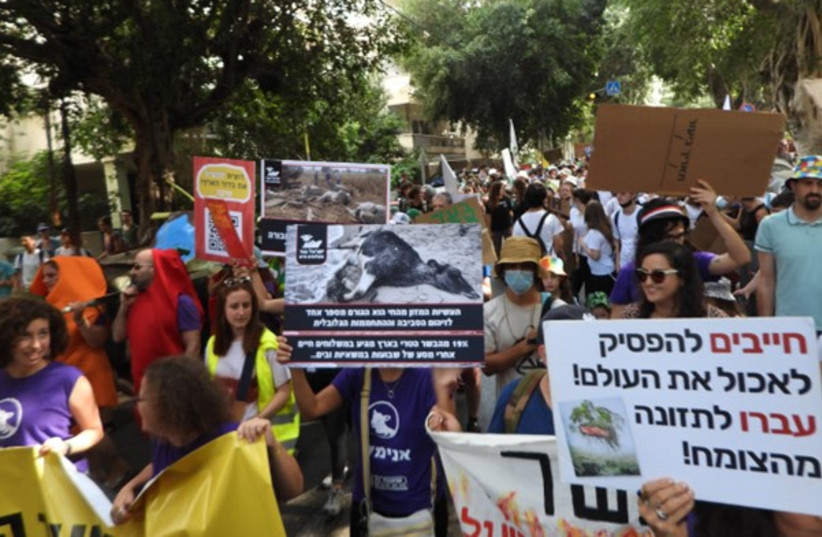Israel is the fourth largest per capita consumer of beef in the world, consuming 19.6 kg of meat per capita per year.
By TZVI JOFFRE
Published: OCTOBER 26, 2022

(photo credit: Freedom4Animal
The Jerusalem and Tel Aviv municipalities have refused to sign the Plant Based Treaty, which entails a commitment to cut back on dependence on animal agriculture, the Freedom4Animals organization said on Tuesday.
The organization lamented that Tel Aviv, known as one of the most vegan-friendly cities in the world, chose to ignore requests by Freedom4Animals to meet concerning the treaty.
The Plant Based Treaty is a grassroots campaign that presents a roadmap to combat climate change fueled by food systems. The treaty calls for governments to focus on plant-based agriculture and cut back on animal agriculture.
About 60,000 individuals, 937 organizations, 949 businesses and 19 cities and states have endorsed the Plant Based Treaty. Just four months ago, those numbers stood at about 40,000 individuals, 750 organizations, 600 businesses and 16 cities and states.
A number of MKs have signed the agreement, as well as dozens of Israeli organizations and companies and thousands of citizens.
Israeli animal rights activist Yael Gabay at the Bonn Climate Change Conference (credit: Plant Based Treaty)
Municipalities and people who sign the treaty are expected to reduce the consumption of food from animals as much as possible. For example, municipalities are expected to reduce such consumption in areas under its responsibility, such as aftercare for children and events it produces.
World leaders to meet for climate conference
The announcement by Freedom4Animals come just over a week ahead of the Sharm el-Sheikh Climate Change Conference (COP27), where world leaders, including Israeli leaders, will meet to discuss how to take action against the climate crisis. The leaders will discuss how to implement the Paris Agreement.
The Paris Agreement is a legally binding international treaty that aims to limit global warming to well below 2C – and preferably below 1.5C – compared to pre-industrial era temperatures.
Animal agriculture is a significant contributor to the climate crisis, with methane emissions, deforestation, biodiversity loss and other issues exacerbating the crisis.
Freedom4Animals noted that despite animal agriculture’s serious contribution to the climate crisis, the Paris Agreement fails to discuss the issue.
The organization stressed that if animal agriculture continues to operate at the pace it operates today, the world will be unable to meet the climate goals set by the Paris Agreement.
In a 2014 report, the Chatham House policy institute stressed that it is unlikely that global temperature rises can be kept below 2C without changes in global meat and dairy consumption.
According to Oxford University researcher Michael Clarke, “even if fossil fuel emissions stopped immediately, emissions from our food systems alone could raise global temperatures by more than 1.5C.”
The IPCC Special Report on Land Use found that a vegetarian diet would save almost 6 gigatons equivalent in greenhouse gas emissions and a vegan diet would raise that to 8 gigatons. The reforestation of lands currently used to farm animals would raise that benefit even higher.
Yael Hanna Gabay, the founder of the Freedom4Animals organization and a global campaign coordinator for the Plant Based Treaty, will join other representatives of the treaty at the conference in Sheikh el-Sharm.
At a UN climate conference in June, Gabay joined other Israeli activists and colleagues from across the world to demand that governments work to cut back on animal agriculture and encourage vegan diets, including by handing out thousands of plant-based hot dogs to delegates.
Municipalities and people who sign the treaty are expected to reduce the consumption of food from animals as much as possible. For example, municipalities are expected to reduce such consumption in areas under its responsibility, such as aftercare for children and events it produces.
World leaders to meet for climate conference
The announcement by Freedom4Animals come just over a week ahead of the Sharm el-Sheikh Climate Change Conference (COP27), where world leaders, including Israeli leaders, will meet to discuss how to take action against the climate crisis. The leaders will discuss how to implement the Paris Agreement.
The Paris Agreement is a legally binding international treaty that aims to limit global warming to well below 2C – and preferably below 1.5C – compared to pre-industrial era temperatures.
Animal agriculture is a significant contributor to the climate crisis, with methane emissions, deforestation, biodiversity loss and other issues exacerbating the crisis.
Freedom4Animals noted that despite animal agriculture’s serious contribution to the climate crisis, the Paris Agreement fails to discuss the issue.
The organization stressed that if animal agriculture continues to operate at the pace it operates today, the world will be unable to meet the climate goals set by the Paris Agreement.
In a 2014 report, the Chatham House policy institute stressed that it is unlikely that global temperature rises can be kept below 2C without changes in global meat and dairy consumption.
According to Oxford University researcher Michael Clarke, “even if fossil fuel emissions stopped immediately, emissions from our food systems alone could raise global temperatures by more than 1.5C.”
The IPCC Special Report on Land Use found that a vegetarian diet would save almost 6 gigatons equivalent in greenhouse gas emissions and a vegan diet would raise that to 8 gigatons. The reforestation of lands currently used to farm animals would raise that benefit even higher.
Yael Hanna Gabay, the founder of the Freedom4Animals organization and a global campaign coordinator for the Plant Based Treaty, will join other representatives of the treaty at the conference in Sheikh el-Sharm.
At a UN climate conference in June, Gabay joined other Israeli activists and colleagues from across the world to demand that governments work to cut back on animal agriculture and encourage vegan diets, including by handing out thousands of plant-based hot dogs to delegates.
Animal agriculture is a significant contributor to the climate crisis, with methane emissions, deforestation, biodiversity loss and other issues exacerbating the crisis.
Freedom4Animals noted that despite animal agriculture’s serious contribution to the climate crisis, the Paris Agreement fails to discuss the issue.
The organization stressed that if animal agriculture continues to operate at the pace it operates today, the world will be unable to meet the climate goals set by the Paris Agreement.
In a 2014 report, the Chatham House policy institute stressed that it is unlikely that global temperature rises can be kept below 2C without changes in global meat and dairy consumption.
According to Oxford University researcher Michael Clarke, “even if fossil fuel emissions stopped immediately, emissions from our food systems alone could raise global temperatures by more than 1.5C.”
The IPCC Special Report on Land Use found that a vegetarian diet would save almost 6 gigatons equivalent in greenhouse gas emissions and a vegan diet would raise that to 8 gigatons. The reforestation of lands currently used to farm animals would raise that benefit even higher.
Yael Hanna Gabay, the founder of the Freedom4Animals organization and a global campaign coordinator for the Plant Based Treaty, will join other representatives of the treaty at the conference in Sheikh el-Sharm.
At a UN climate conference in June, Gabay joined other Israeli activists and colleagues from across the world to demand that governments work to cut back on animal agriculture and encourage vegan diets, including by handing out thousands of plant-based hot dogs to delegates.
“In a few days, we will arrive together with representatives from all over the world in Sharm el-Sheikh to participate in another conference that will deal with dealing with the climate crisis. Our representatives will engage without politics and without borders, in a wake-up call to add the plant-based nutrition treaty annex to the Paris Agreement just before it is too late,” said Gabay.
“We received the status of official observers for the committee because there are parties who are beginning to understand the importance of the matter. I have children, and every time I go on a trip with them I explain to them that this may be the last time they see the place because, in the event of a climate disaster, the world will no longer look the way we know it.”
Israel is the fourth largest beef consumer worldwide
Israel is the fourth largest per capita consumer of beef in the world, consuming 19.6 kg of meat per capita per year. In comparison, the per capita consumption of meat in OECD countries was 14.4 kg per year, about 5 kg less than in Israel. [The Health Ministry recommends eating no more than 300 grams of beef/red meat per week (or 15.6 kilograms of beef per year)]
The only countries that have a higher meat consumption than Israel are Argentina, the US and Brazil.
Over 70% of fresh meat slaughtered in Israel comes from calves imported from Europe and Australia, according to the Agriculture Ministry.
While meat consumption has grown by 50% since 2015, in 2021, quantitative sales of fresh meat in Israel fell by 2%, while sales of frozen meat fell by 12%, according to Stormcast data.
https://www.jpost.com/environment-and-climate-change/article-720600

